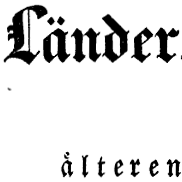Definify.com
Webster 1913 Edition
umlaut
‖
um′laut
(oōm′lout)
, Noun.
[G., from
um
about + laut
sound.] (Philol.)
The euphonic modification of a root vowel sound by the influence of a, u, or especially i, in the syllable which formerly followed.
☞ It is peculiar to the Teutonic languages, and was common in Anglo-Saxon. In German the umlauted vowels resulting from a, o, u, followed by old i, are written ä, ö, ü, or ae, oe, ue; as, männer or maenner, men, from mann, man. Examples of forms resulting from umlaut in English are geese pl. of goose, men pl. of man, etc.
Definition 2026
Umlaut
Umlaut
See also: umlaut
German
Noun
Umlaut m (genitive Umlauts or Umlautes, plural Umlaute)
- umlaut
- 1774, Friedrich Gottlieb Klopstock, Die deutsche Gelehrtenrepublik. Ihre Einrichtung. Ihre Geseze. Geschichte des letzten Landtags. Auf Befehl der Aldermänner durch Salogast und Wlemar. Erster Theil., Hamburg, p.229 (also: Die deutsche Gelehrtenrepublik, ihre Einrichtung, ihre Gesetze, Geschichte des letzten Landtags – Auf Befehl der Aldermänner durch Salogast und Wlemar – Vermehrte und verbesserte Ausgabe, Leipzig, 1817, p.212):
- Wem solte es undeutlich seyn, wenn ich zum Exempel sagte: Aus Strom wird Ströme, und sang aus singen, durch den Umlaut?
- 1774, Friedrich Gottlieb Klopstock, Die deutsche Gelehrtenrepublik. Ihre Einrichtung. Ihre Geseze. Geschichte des letzten Landtags. Auf Befehl der Aldermänner durch Salogast und Wlemar. Erster Theil., Hamburg, p.229 (also: Die deutsche Gelehrtenrepublik, ihre Einrichtung, ihre Gesetze, Geschichte des letzten Landtags – Auf Befehl der Aldermänner durch Salogast und Wlemar – Vermehrte und verbesserte Ausgabe, Leipzig, 1817, p.212):
- The diacritical mark ( ¨ ) placed over a vowel to indicate such assimilation: ä, ö, ü.
- one of the German letters ä, ö, ü (capital letter: Ä, Ö, Ü)
Synonyms
- Halbdoppellaut (referring to letters ä, ö, ü, or their sounds)
- Umlautbuchstabe (umlaut letter)
- Umlauter
Derived terms
- Rückumlaut
- umlauten
- Umlautung
Descendants
- English: umlaut
umlaut
umlaut
See also: Umlaut
English

Two umlaut diacritics used on the same page of an old book: two dots above the first a, a small e above the second one. Umlaut was originally represented by a following e, then an e above: e resembled two slanted, mostly vertical lines in German handwriting, hence the simplification to two lines (resembling ʺ ) and finally to two dots.

Development of the umlaut in German handwriting.
Noun
umlaut (plural umlauts or umlaute)
- (linguistics) An assimilatory process whereby a vowel is pronounced more like a following vocoid that is separated by one or more consonants.
- (linguistics) The umlaut process (as above) that occurred historically in Germanic languages whereby back vowels became front vowels when followed by syllable containing a front vocoid (e.g. Germanic lūsiz > Old English lȳs(i) > Modern English lice).
- (linguistics) A vowel so assimilated.
- (orthography) The diacritical mark ( ¨ ) placed over a vowel when it indicates a (rounded) front vowel
- (informal, orthography) Synonym of diaeresis
- Naive takes an umlaut as it's pronounced as two syllables.
Usage notes
- Although this symbol has the same form as the diaeresis/dieresis, it has as a different function and so in standard and technical usage these two terms are not interchangeable. The term for the diacritic mark, as opposed to its function, is trema.
- When spelling a German word out loud, one can say “(vowel) umlaut” or “umlauted (vowel)”. e.g. “a umlaut” or “umlauted a” (ä). (German practice is to say “a Umlaut”, or more commonly to pronounce the letters, so the name of "Ä" is [ɛː], just as "A" is [aː] and "B" is [beː].)
- In alphabetic orders, "ä, ö, ü" are treated as "a, o, u" or "ae, oe, ue" in German (so the word lügen comes directly after or before the word lugen). In other languages, such as Swedish, the umlaut letters may have their own position in the alphabet.
- The usual English plural is umlauts, but the form umlaute (after the German) has seen some use. It is quite rare, however.
Synonyms
- (orthography): trema
- (linguistics): vowel mutation
Derived terms
Related terms
Translations
partial assimilation of a vowel
vowel so assimilated
diacritical mark
|
Verb
umlaut (third-person singular simple present umlauts, present participle umlauting, simple past and past participle umlauted)
- (transitive) To place an umlaut over (a vowel).
- (linguistics, transitive) To modify (a word) so that an umlaut is required in it.
- an umlauting vowel
See also
Anagrams
Finnish
Etymology
Noun
umlaut
- umlaut (assimilation a->ä, o->ö or u->ü in German and some closely related languages)
Declension
| Inflection of umlaut (Kotus type 5/risti, no gradation) | |||
|---|---|---|---|
| nominative | umlaut | umlautit | |
| genitive | umlautin | umlautien | |
| partitive | umlautia | umlauteja | |
| illative | umlautiin | umlauteihin | |
| singular | plural | ||
| nominative | umlaut | umlautit | |
| accusative | nom. | umlaut | umlautit |
| gen. | umlautin | ||
| genitive | umlautin | umlautien | |
| partitive | umlautia | umlauteja | |
| inessive | umlautissa | umlauteissa | |
| elative | umlautista | umlauteista | |
| illative | umlautiin | umlauteihin | |
| adessive | umlautilla | umlauteilla | |
| ablative | umlautilta | umlauteilta | |
| allative | umlautille | umlauteille | |
| essive | umlautina | umlauteina | |
| translative | umlautiksi | umlauteiksi | |
| instructive | — | umlautein | |
| abessive | umlautitta | umlauteitta | |
| comitative | — | umlauteineen | |
Hypernyms
Manx
Etymology
Noun
umlaut m (genitive singular umlaut, plural umlautyn)
- (linguistics, orthography) umlaut
Portuguese
Noun
umlaut m (plural umlauts)
- (linguistics) umlaut (partial assimilation of a vowel in Germanic languages)
- (orthography) umlaut (the diacritical mark ¨ used to indicate such assimilation)